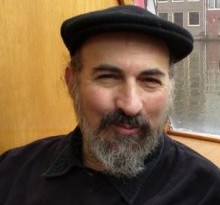Saying Kaddish
Today marks six months since my mother Maria passed away (If you want to know something about this remarkable woman, you can read the eulogy I gave for her by clicking here). Six months that I have been a mourner. I am over half way through the 11 months of making an extra effort to get to a minyan every day so that I can say the Kaddish memorial prayer.
I still have not quite gotten used to the idea that my Mom is no longer with us. That I can’t pick up the phone and call her. And there are plenty of times in the last six months when I wanted to call her, when I would have called her. And I have called, in my mind, but as anyone who has been there knows, it’s not quite the same.
When I was a congregational rabbi and would either counsel people or teach adult education classes, I would teach the traditional reasons for saying Kaddish — it benefits the deceased — as well as the “psychological” interpretation, that it’s good for mourners to get out of the house, to be in the company of other people, to know that they are not alone, that others are experiencing the same thing. A sort of built-in support group.
But is it really much of a support group? For the most part, people at daily minyans are in a hurry: in the morning it’s before work, people are rushing to get to work. In the afternoon, it’s a 15 minutes break in the middle of the work day; in the evening, if you go to the later minyans, it’s after dinner, people are tired and want to get home. No one particularly provides any support. At your “home” shul people know who you are saying kaddish for, but if you happen to go somewhere else, generally no one asks.
I have found that for me the thing I most appreciate about saying Kaddish is that it makes me think about my Mom every day. Does that sound cold? That I wouldn’t think of her otherwise? I don’t know. I’m a busy guy. Is out of sight out of mind really an indicator of callousness? Or is it just human nature?
But whether I would have thought of her otherwise or not, I KNOW I think of her every time I say Kaddish. And that’s another very important reason to say Kaddish. In a way it gives the departed loved one an extension of life. Scientific studies have repeatedly shown that with memory it’s “use it or lose it.” So if you don’t spend some time thinking about a person, spend some time “refreshing the memory,” the memories will fade. So there is real value in reinforcing the memories.
I also very much appreciate the daily reminder. I very much appreciate bringing my Mom into my life for at least a few minutes every day as I think about her when I say Kaddish. Yes, it reminds me of how much I miss her, but it’s a pleasant reminder.
It’s also given me an opportunity to visit many synagogues I otherwise might not have visited. Since I started saying Kaddish, I’ve said the prayer in Israel, the US, The Netherlands and the Philippines. I’ve said it New York, New Jersey, Colorado, California, and Georgia. I’ve said it in Conservative, Orthodox, Reform, and Renewal synagogues. I’ve said it in private homes and I’ve said it in office buildings and shopping centers. Even though I often try to go to a minyan when I’m traveling, just to see other Jewish communities, when you are saying Kaddish you make an extra effort that you otherwise might not make.
As I reflect on how meaningful it has been for me to say Kaddish, I’m reminded how there are actually some people who pay others to say Kaddish for them. The first time I heard of this I was flabbergasted. Sorry, but you really cannot pay someone else to mourn for you. There are some things you just have to do for yourself. I’m sure we can all think of other activities as well that you just really can’t delegate, no matter how much you might want to.
I also want to say if you are part of a community that sometimes struggles to make a minyan, the people saying Kaddish really do appreciate the effort when others come out to help make a minyan. That DOES feel very supportive…so please, support your local minyan…that way they will also be there for you when the time comes that you need a minyan.
Reb Barry




Dear Barry:
It’s been nearly 22 years since my mother died, and I still go to call her or want to ask her about some piece of our history or how to cook the food my family never gets to enjoy anymore.
As for minyan and kaddish – it occurs to me there’s another piece: at a time when your world has been turned upside down, minyan is predictability. Whether you’re at your “home” shul or one of a couple of places (this one only has morning minyan, that one only evening…) or travel the world, every single day there’s shaharit, minha and arvit. There’s sh’ma, amidah, kaddish. You know where you have to be. You know (more or less) what to expect, whether you know the people or not. That can be very comforting.
May God continue to console you.
Diane
Hi Diane, thanks for that. There is indeed comfort in the predictability, in the ritual.
Barry